实用英语口语最容易理解错误的句子
容易理解错误的英语句子
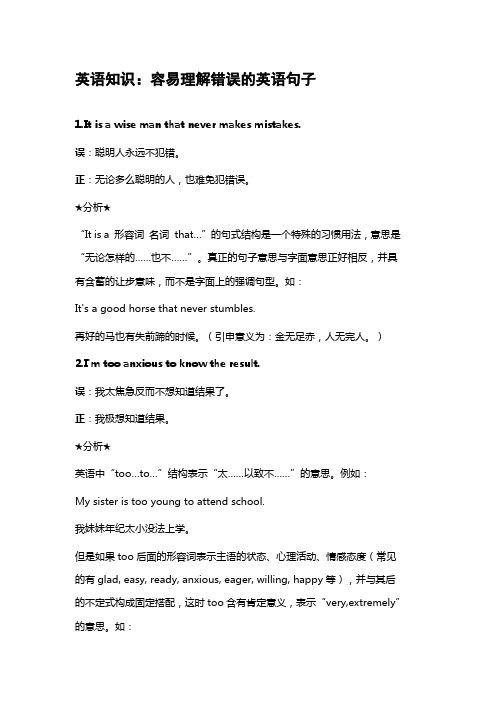
英语知识:容易理解错误的英语句子1.It is a wise man that never makes mistakes.误:聪明人永远不犯错。
正:无论多么聪明的人,也难免犯错误。
★分析★“It is a 形容词名词that…”的句式结构是一个特殊的习惯用法,意思是“无论怎样的……也不……”。
真正的句子意思与字面意思正好相反,并具有含蓄的让步意味,而不是字面上的强调句型。
如:It's a good horse that never stumbles.再好的马也有失前蹄的时候。
(引申意义为:金无足赤,人无完人。
)2.I'm too anxious to know the result.误:我太焦急反而不想知道结果了。
正:我极想知道结果。
★分析★英语中“too…to…”结构表示“太……以致不……”的意思。
例如:My sister is too young to attend school.我妹妹年纪太小没法上学。
但是如果too后面的形容词表示主语的状态、心理活动、情感态度(常见的有glad, easy, ready, anxious, eager, willing, happy等),并与其后的不定式构成固定搭配,这时too含有肯定意义,表示“very,extremely”的意思。
如:We are only too happy to take care of your dog for the weekend.我们非常乐意周末帮你照顾狗狗。
3.All that glitters is not gold.误:所有闪光的都不是金子。
正:闪光的东西不一定都是金子。
★分析★在句中当不定代词all,both, every…,或者副词always, often, entirely与not一起使用时,表示部分否定,意思是“并非都是”,“不是每个人都”等。
如:I don't remember all these formulas.这些公式我并非全都记得。
英语谚语 容易理解错误的英语
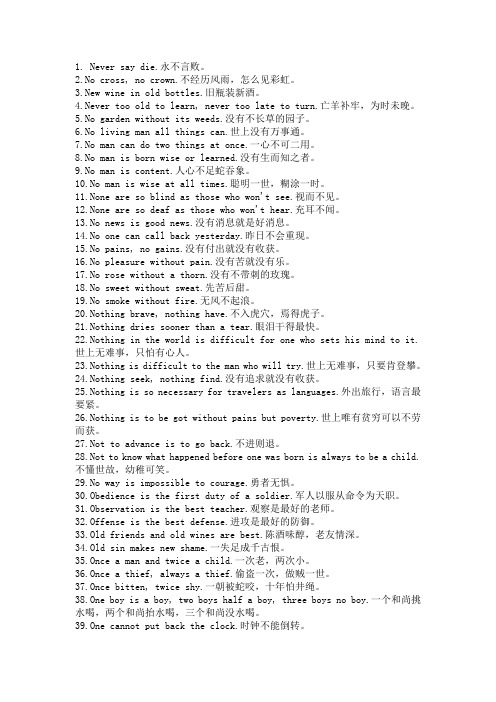
1. Never say die.永不言败。
2.No cross, no crown.不经历风雨,怎么见彩虹。
3.New wine in old bottles.旧瓶装新酒。
4.Never too old to learn, never too late to turn.亡羊补牢,为时未晚。
5.No garden without its weeds.没有不长草的园子。
6.No living man all things can.世上没有万事通。
7.No man can do two things at once.一心不可二用。
8.No man is born wise or learned.没有生而知之者。
9.No man is content.人心不足蛇吞象。
10.No man is wise at all times.聪明一世,糊涂一时。
11.None are so blind as those who won't see.视而不见。
12.None are so deaf as those who won't hear.充耳不闻。
13.No news is good news.没有消息就是好消息。
14.No one can call back yesterday.昨日不会重现。
15.No pains, no gains.没有付出就没有收获。
16.No pleasure without pain.没有苦就没有乐。
17.No rose without a thorn.没有不带刺的玫瑰。
18.No sweet without sweat.先苦后甜。
19.No smoke without fire.无风不起浪。
20.Nothing brave, nothing have.不入虎穴,焉得虎子。
21.Nothing dries sooner than a tear.眼泪干得最快。
22.Nothing in the world is difficult for one who sets his mind to it.世上无难事,只怕有心人。
英语口语学习中容易误解的句子
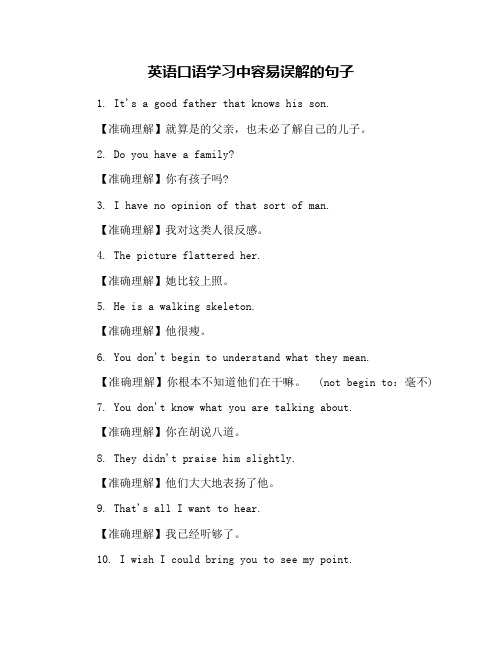
英语口语学习中容易误解的句子1. It's a good father that knows his son.【准确理解】就算是的父亲,也未必了解自己的儿子。
2. Do you have a family?【准确理解】你有孩子吗?3. I have no opinion of that sort of man.【准确理解】我对这类人很反感。
4. The picture flattered her.【准确理解】她比较上照。
5. He is a walking skeleton.【准确理解】他很瘦。
6. You don't begin to understand what they mean.【准确理解】你根本不知道他们在干嘛。
(not begin to:毫不) 7. You don't know what you are talking about.【准确理解】你在胡说八道。
8. They didn't praise him slightly.【准确理解】他们大大地表扬了他。
9. That's all I want to hear.【准确理解】我已经听够了。
10. I wish I could bring you to see my point.【准确理解】你要我怎么说你才能明白呢。
11. You really flatter me.【准确理解】你让我受宠若惊。
12. He made a great difference.【准确理解】他很关键。
13. You cannot give him too much money.【准确理解】你给他再多的钱也不算多。
(not…too/over…连用表示“再…也不为过”)14. The long exhausting trip proved too much.【准确理解】这次旅行旷日持久,我们都累倒了。
15. She held the little boy by the right hand.【准确理解】她抓着小男孩的右手。
容易误会的英语情景交际用语

容易误会的英语情景交际用语在英语情景交际中,有些用语可能会因为文化差异或语境不同而容易引发误会。
以下是一些常见的容易误会的英语情景交际用语及其解释:1.“How are you?”●误解:很多人可能会直接回答“I'm fine”或者“I'm good”,但在很多英语母语者的日常交流中,这只是一个问候语,不一定需要详细回答。
●正确理解:通常这是一个礼貌的问候,不需要深入的回答,除非对方明显想要进一步的交流。
2.“You're welcome!”●误解:在某些文化中,人们可能会误以为“You're welcome!”是对方表示感谢后唯一正确的回应。
●正确理解:这只是一个礼貌的回应,你也可以用“No problem”或者“Don't mention it”等来表达同样的意思。
3.“Thank you for your help.”●误解:当别人提供帮助时,如果不接受帮助,有些人可能会误以为不需要表示感谢。
●正确理解:即使你不需要帮助或者已经自己解决了问题,也要表示感谢,因为对方的好意值得肯定。
4.“Small talk”●误解:在一些文化中,直接谈论私人问题或深入话题被视为真诚,但在许多英语国家,人们可能更倾向于谈论日常琐事或天气等轻松的话题。
●正确理解:小聊天(small talk)是建立关系、缓解紧张气氛的一种方式,不一定要深入或严肃。
5.“I'm sorry.”●误解:这个短语有时会被误解为仅仅是对错误或失误的道歉,但实际上它也可以用来表达同情或遗憾。
●正确理解:这个短语有多种用途,不仅仅是对自己行为的道歉,也可以用来表达对他人的同情或理解。
6.“No problem!”●误解:在某些情况下,这个短语可能会被误解为对方完全没有问题或困难。
●正确理解:这通常意味着对方愿意提供帮助,或者对某事表示不介意。
7.“That's OK.”●误解:这个短语有时会被误解为对方完全满意或同意某事。
最容易被错误理解的英语句子118句
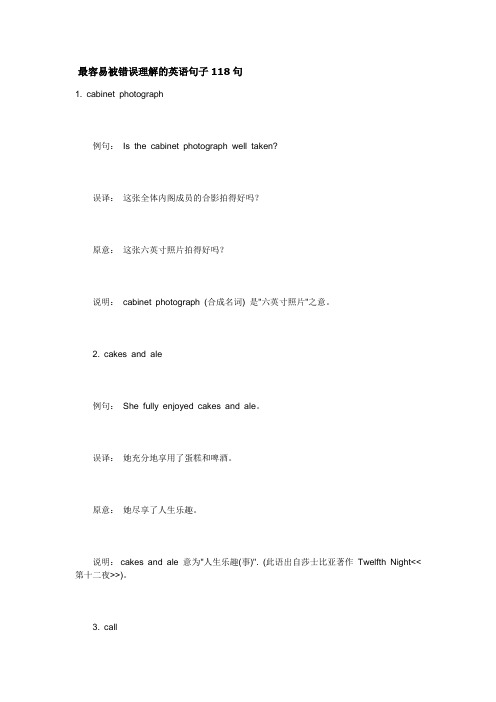
最容易被错误理解的英语句子118句1. cabinet photograph例句:Is the cabinet photograph well taken?误译:这张全体内阁成员的合影拍得好吗?原意:这张六英寸照片拍得好吗?说明:cabinet photograph (合成名词) 是"六英寸照片"之意。
2. cakes and ale例句:She fully enjoyed cakes and ale。
误译:她充分地享用了蛋糕和啤酒。
原意:她尽享了人生乐趣。
说明:cakes and ale 意为"人生乐趣(事)". (此语出自莎士比亚著作Twelfth Night<<第十二夜>>)。
3. call例句:He has no call to flare up。
误译:他没有发怒大叫。
原意:他没有必要发怒。
说明:本例的call (名词),意为"必要","理由". 作此解时一般用于否定句和疑问句。
4. call one names例句:My grandpa told me not to call him names。
误译:我爷爷告诉我不要叫他的名字。
原意:我爷爷叫我不要骂他。
说明:call one names 意为"辱骂某人",用于口语. 值得注意的是,one 一定要用宾格,而不是所有格,即不是one's. "names" 一定是复数"names", 否则就不是此意. 如上例,若该成My grandpa told me not to call his name. 则是"我爷爷叫我不要叫他的名字". call one's name 中的name 根据情况,可用单数和复数。
5. can例句:Buy up all the pineapples! We can can them。
易理解错的英语句子
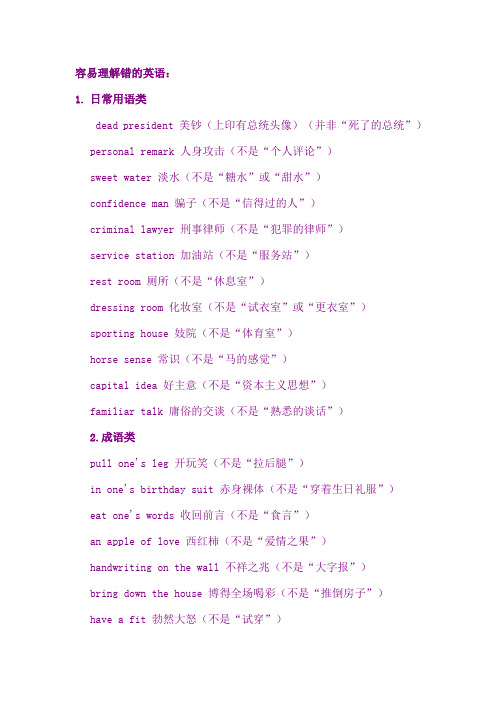
容易理解错的英语:1.日常用语类dead president 美钞(上印有总统头像)(并非“死了的总统”)personal remark 人身攻击(不是“个人评论”)sweet water 淡水(不是“糖水”或“甜水”)confidence man 骗子(不是“信得过的人”)criminal lawyer 刑事律师(不是“犯罪的律师”)service station 加油站(不是“服务站”)rest room 厕所(不是“休息室”)dressing room 化妆室(不是“试衣室”或“更衣室”)sporting house 妓院(不是“体育室”)horse sense 常识(不是“马的感觉”)capital idea 好主意(不是“资本主义思想”)familiar talk 庸俗的交谈(不是“熟悉的谈话”)2.成语类pull one's leg 开玩笑(不是“拉后腿”)in one's birthday suit 赤身裸体(不是“穿着生日礼服”)eat one's words 收回前言(不是“食言”)an apple of love 西红柿(不是“爱情之果”)handwriting on the wall 不祥之兆(不是“大字报”)bring down the house 博得全场喝彩(不是“推倒房子”)have a fit 勃然大怒(不是“试穿”)make one's hair stand on end 令人毛骨悚然—恐惧(不是“令人发指”)be taken in 受骗,上当(不是“被接纳”)think a great deal of oneself 高看或看重自己(不是“为自己想得很多”)pull up one's socks 鼓起勇气(不是“提上袜子”)have the heart to do (用于否定句)忍心做……(不是“有心做”或“有意做”)3.表达方式类Look out! 当心!(不是“向外看”)What a shame! 多可惜!真遗憾!(不是“多可耻”)You don't say! 是吗!(不是“你别说”)You can say that again! 说得好!(不是“你可以再说一遍”)I haven't slept better. 我睡得好极了。
雅思考试中容易理解错的句子
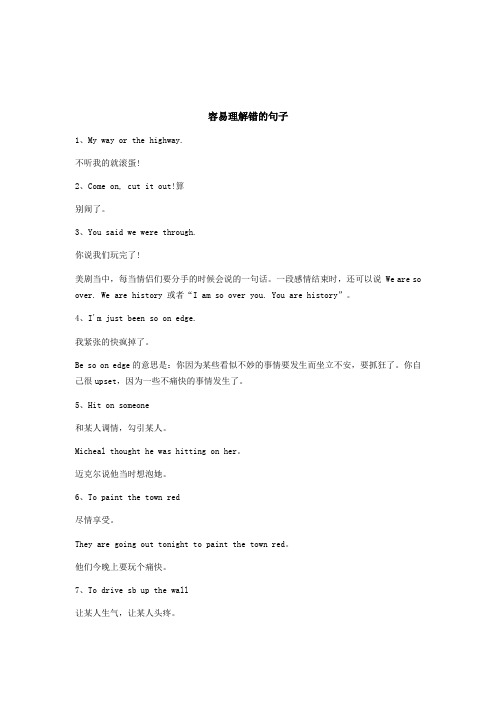
容易理解错的句子1、My way or the highway.不听我的就滚蛋!2、Come on, cut it out!算别闹了。
3、You said we were through.你说我们玩完了!美剧当中,每当情侣们要分手的时候会说的一句话。
一段感情结束时,还可以说 We are so over. We are history 或者“I am so over you. You are history”。
4、I'm just been so on edge.我紧张的快疯掉了。
Be so on edge的意思是:你因为某些看似不妙的事情要发生而坐立不安,要抓狂了。
你自己很upset,因为一些不痛快的事情发生了。
5、Hit on someone和某人调情,勾引某人。
Micheal thought he was hitting on her。
迈克尔说他当时想泡她。
6、To paint the town red尽情享受。
They are going out tonight to paint the town red。
他们今晚上要玩个痛快。
7、To drive sb up the wall让某人生气,让某人头疼。
The boy is driving his mother up the wall because of his ill behavior。
这个不听话的孩子让他的妈妈大为头疼。
8、To keep one's nose clean。
远离是非,少惹麻烦。
The newly released inmates are trying to keep their noses clean。
刚刚释放的犯人们总是尽量的少惹是非。
9、To play cat and mouse欲擒故纵。
The police have played cat and mouse with the murderer。
警察采用欲擒故众的方式抓捕这个谋杀犯。
英语短语容易误解的10个句子

英语短语容易误解的10个句子英语短语容易误解的10个句子1. Do you have matches?最近我有一次机会登上一艘豪华游轮观光。
我在酒吧台拿了两杯鸡尾酒回房间享受,途中遇到一位女士,她看看我后笑着说:"You have matches?"我一愣,回答说:“很抱歉,我十五年前就戒烟了,所以没有火柴。
”她立刻会意到我误解了她的意思,好像是有点抱歉地说:"It's a joke."然后,除了尴尬就没有然后了。
事后和朋友在吃晚饭的时候聊天,我趁机向一个美国朋友请教白天的那句话,他解释说:“因为她看你两手都占着,就故意开玩笑跟你要火柴,这是个非常普通的笑话,其实是想问你需不需要帮忙。
”2. Turn the table一位亲戚和妻子失和到了要离婚的地步。
几天前接到亲戚电话,说他们在走进律师楼之前,先去求助于心理和婚姻问题专家。
夫妇俩心平气和地坐下来谈了好多次,互相之间多了份理解,少了一份猜疑、埋怨,结果化干戈为玉帛。
说简单也简单,就这么拯救了这场婚姻。
我打心眼里为他们高兴,把这一消息告诉了同样也认识他们的一位美国朋友。
这位朋友很激动,还补了一句:"He turned the table"。
这话让我心里很不舒服,她是指我亲戚动粗吗?直到朋友以另一种方法向我解释,她是说我亲戚“扭转了局面”,那table和我想到的“桌子”根本无关。
turn the tables (on someone) = to suddenly take a positionof strength or advantage that was formerly held by someone else(反败为胜,转弱为强)例句:She played badly in the first set, but then she turned thetables on her opponent and won the match。
- 1、下载文档前请自行甄别文档内容的完整性,平台不提供额外的编辑、内容补充、找答案等附加服务。
- 2、"仅部分预览"的文档,不可在线预览部分如存在完整性等问题,可反馈申请退款(可完整预览的文档不适用该条件!)。
- 3、如文档侵犯您的权益,请联系客服反馈,我们会尽快为您处理(人工客服工作时间:9:00-18:30)。
实用英语口语:最容易理解错误的句子
在生活中一些简单英语句子,不按套路翻译的英语句子可能会难倒一大批人。
1.Do you have a family?
你有孩子吗?
2.It's a good father that knows his son.
就算是最好的父亲,也未必了解自己的儿子.
3.I have no opinion of that sort of man.
我对这类人很反感.
4.She put 5 dollars into my hand,"you have been a great man today." 她把5美圆塞到我手上说:"你今天表现得很好."
5.I was the youngest son, and the youngest but two.
我是最小的儿子,但是我还有两个妹妹.
6.The picture flattered her.
她比较上照.
7.The country not agreeing with her, she returned to England.
她杂那个国家水土不服,所以回到了英国.
8. He is a walking skeleton.
他很瘦.
9.The machine is in repair.
机器已经修好了.
10.He allowed the father to be overruled by the judge, and declared his own son guilty.
他让法官的职责战胜了父子的亲情,最终宣布儿子有罪.
11.You don't know what you are talking about.
你在胡说八道.
12.You don't begin to understand what they mean.
你根本不知道他们在干嘛. don't begin :决不
13.They didn't praise him slightly.
他们大大地表扬了他.
14.That's all I want to hear.
我已经听够了.
15.I wish I could bring you to see my point.
你要我怎么说你才能明白呢.
16.You really flatter me.
你让我受宠若惊.
17.He made a great difference.
有他没他结果完全不一样.
18.You cannot give him too much money.
你给他再多的钱也不算多.
19.The long exhausting trip proved too much.
这次旅行矿日持久,我们都累倒了.
20.The monk is only not a dead man.
这个和尚虽然活着,但跟死了差不多.
21.A surgeon made a cut in the patient's stomach.
外科医生在病人胃部打了个洞.
22.You look darker after the holiday.
你看上去更健康了.
23.As luck would have it, he was caught by the teacher again. 不幸的是,他又一次被老师逮个正着.
24.She held the little boy by the right hand.
她抓着小男孩的右手.(这里"by"与"with"动作主语完全相反.)
25.Are you there?
等于句型:Do you follow me?
26.If you think he is a good man, think again.
如果你认为他是好人,那你就大错特错了.
27.She has blue eyes.
她长着双蓝眼睛.
28.That took his breath away.
他大惊失色.
29.Two is company but three is none.
两人成伴,三人不欢.
30.The elevator girl reads between passengers.
开电梯的姑娘在没有乘客时看书.
"between"="without":相同用法:She modeled between roles.译成:她不演戏时去客串下模特.
31.Students are still arriving.
学生还没有到齐.
32.I must not stay here and do nothing.
我不能什么都不做待在这儿.
33.They went away as wise as they came.
他们一无所获.
34.I won’t do it to save my life.
我死也不会做.
35.Nonsense, I don’t think his painting is any better than yours.
胡说,我认为他的画比你好不到哪去.
36.Traditionally, Italian presidents have been seen and not heard.
这个总统有名无权.
37.Better late than the late.
迟到总比丧命好.
38.You don’t want to do that.
你不应该去做。
39.My grandfather is nearly ninety and in his second childhood. 我祖父快90岁了,什么事都需要别人来做.
40.Work once and work twice.
一次得手,再次不愁.
41.Rubber easily gives way to pressure.
橡胶很容易变形.
42.If my mother had known of it she'd have died a second time. 要是我妈妈知道了,她会从棺材里爬起来.
43. As luck would have it, he was caught by the teacher again. 不幸的是,他又一次被老师逮个正着。
44. She held the little boy by the right hand.
她抓着小男孩的右手。
(这里用“by”与用“with”意思区别很大。
)
45. Are you there?
你在哪里?等于句型:Do you follow me?
46. If you think he is a good man, think again.
如果你认为他是好人,那你就大错特错了。
47. If my mother had known of it she'd have died a second time. 要是我妈妈知道了,她会从棺材里爬起来。
48. That took his breath away.
他大惊失色。
(很形象的说法啊~)
49. Rubber easily gives way to pressure.
橡胶很容易变形。
50. The elevator girl reads between passengers.
开电梯的姑娘在没有乘客时看书。
between=without,相同用法:
She modeled between roles.
她不演戏时去客串下模特。
51. Students are still arriving.
学生还没有到齐。
52. I must not stay here and do nothing.
我不能什么都不做待在这儿。
53. They went away as wise as they came.
他们一无所获。
(这句有点意料之外,不过仔细一想貌似的确有道理啊~)54. I won't do it to save my life.
我死也不会做。
55. Nonsense, I don't think his painting is any better than yours.
胡说,我认为他的画比你好不到哪去。
(好吧……原来是说两个人画得都不咋样……)
56. Traditionally, Italian presidents have been seen and not heard.
从传统上看,意大利总统有名无权。
57. Work once and work twice.
一次得手,再次不愁。
58. You don't want to do that.
你不应该去做。
59. My grandfather is nearly 90 and in his second childhood.
我祖父快90岁了,什么事都需要别人来做。
